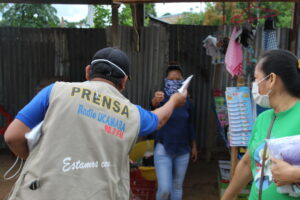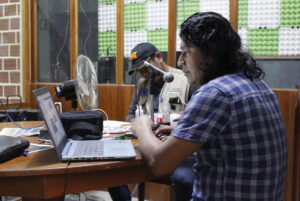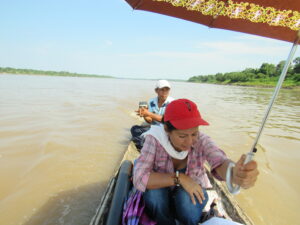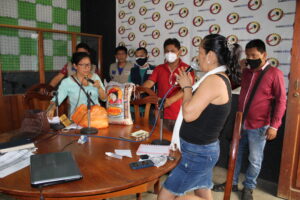“… The mother of the disease has arrived, and in each town that she passes, she leaves behind death, tears and sadness. She looks for our lives in public places where many people gather without being careful. It's called coronavirus. We are going to stop it together, we are going to beat it, so avoid being in places with a lot of people, stay home, wear a mask, wash your hands with soap. The coronavirus is not going to defeat us. We are all going to save ourselves, or there will be no salvation… ”.
This radio spot, which is part of a series of six similar installments aimed at prevention, was produced in the middle of last year at the height of the pandemic by Radio Ucamara, which gets its name from the merger of the Ucayali and Marañón rivers that form the mighty Amazon River.

Radio Ucamara started 29 years ago. (Courtesy Radio Ucamara)
The community radio station that began 29 years ago is directed, produced and hosted by communicators, citizens of the Indigenous Kukama people. They are communicators in the city of Nauta, Loreto, in the northeastern region of the Peruvian Amazon. Despite the limitations of their radio station’s 500 watts reach, they manage to be heard in Indigenous communities near the border area with Ecuador, places that are 18 days away by river.
According to data from the Ministry of Health, Peru has had about 45,000 deaths from COVID-19, of which 1,152 correspond to the Loreto region. A recent report on the impact of the pandemic said that 3,126 Indigenous people have died in Peru as of Dec. 21, 2020.
The deficiency of health services, lack of personnel, medication, added to the limitations in planning, budget, transportation and digital connectivity, has meant that thousands of residents in communities far from cities are left without information on the pandemic. Added to this is the lack of content production that has meant that communities and citizens receive very little or no coverage from radio corporations based in Lima that have a nationwide signal.
Carlos Rivadeneyra, professor at the University of Lima and former regional coordinator of the World Association of Community Radio Stations (AMARC - ALC), said radio stations that are not large corporations are going through an acute emergency. Many have closed, they broadcast for fewer hours, working from a physical booth is not possible due to COVID-19, according to Rivadeneyra. Additionally, there are not strong governmental policies to help the media outlet beyond attending to the documentation to keep permits up to date.
Despite the fact that community stations stopped broadcasting in this pandemic, Radio Ucamara, at 98.7 FM, continued with its mission of revitalizing and recovering the Kukama language and culture. From confinement, it was impossible for the communicators to travel, but they managed to inform, channel support, guide and carry out campaigns based on ancestral knowledge and the communities' own traditions, to overcome the challenge of social and geographical distance.
A space where your word counts
Leonardo Tello Imaina, son of a Kukama father and an Achuar mother, has been in radio for 19 years.

Leonardo Tello Imaina, son of a Kukama father and Achuar mother, has worked in the radio for 19 years. (Courtesy Radio Ucamara)
“… It led me to be at this media outlet, seeing the case of some brothers, fishermen in the river who were murdered, protecting their territory, who fought so hard for the Amazon,” he said. “Communication within this community was not enough, we had to begin to see that our eyes only were not enough, we needed the eyes of other people, to feel that there, despite the pain, we must transform and cherish life, that is where I see myself as a communicator.”
Having just finished planning pandemic-related activities for the radio station, the director of Radio Ucamara recalled the media outlet’s origins and remembered the challenges it experienced when the pandemic was hit.
“… Almost all the radio stations closed when the quarantine began, some remained and offered music, but no more,” Tello Imaina told LatAm Journalism Review (LJR). “The Achuar, who had been infected with the arrival of the mayor of another town, Trompeteros, called us from the Corrientes River. The apu (leader) of the community called us to tell us what was happening. Thus, we communicated with the Ombudsman's Office, the police, the Regional Health Directorate, so that they could deploy brigades in the face of what was happening. We learned the challenge was to manage immediate attention to the population.”
The Achuar did not think a media outlet would go there to report because of the distance, but Radio Ucamara sent a correspondent to the river’s entrance.
“So we had an idea of what was happening day by day,” Tello Imaina said.
Before the pandemic began, the Radio Ucamara team consisted of twelve people. Six were "wise Kukama old men and women" who stopped participating in radio and spot productions, as well as videos, due to the obvious risk. At some point later, of the remaining six, three became ill and the remaining three had to continue to produce for the radio station for two months.
From the beginning, seeing that it was impossible to leave and move around, they began to call the communities from Ucamara until they came to assemble a network of 21 people, residents of a diversity of communities distant from each other, as well as border areas. All of them men, women, young people, became correspondents. They had never done news reports– this was the first time.
The radio station was able to get a donation to charge $3 a week to cell phones, which allowed them to report and communicate with their families. From 6 to 9 am every day, Radio Ucamara prioritized the broadcasting of reports and interviews from the communities, or interacted with national and international media outlets.
Tello Imaina recalled that despite the challenging climate of the jungle and the limitations of the signal’s reach, the correspondents’ signal was cut only three times, in which case they had to send their audio recordings from WhatsApp. The broadcast was always carried out live and direct. Most of them reported from low-end cell phones. Despite this, they shared programs or spots in the Achuar language on loudspeakers in their communities or from radios in their own homes.
During the pandemic, content centered on developing stories based on accounts and experiences related to preventing disease. Speaking the same language and narrating from memory, empathy and mutual knowledge, communication became powerful since it did not need much explanation because the reporters and interviewees had a shared experience. Now it was time to tell how the communities were preparing their medicines, how they were taking them, how they were recovering, and this was known from the participation of the families. That was the campaign to isolate evil spirits and death.
“Ucamara's contribution is ‘let's go to work,’ for a people to represent themselves with pride, with joy. It is to show the people's own issues, that they feel proud. If we do not work on that, what we do is marginalize a people, put a gun to their heads, that ruins anybody, no one listens to a radio station that does not revitalize,” Tello Imaina said.
During this second outbreak of COVID-19, Radio Ucamara is committed to continuing to consolidate formats that benefit correspondents. In many towns, there are only one or two hours of electricity, which is also expensive. Despite budget limitations, they will be supplied with an electric generator and solar battery, which will allow the charging of 20 cell phones so that the correspondents can continue to communicate.
The production of 10 video tutorials, lasting 10 to 15 minutes, will also make it easier for correspondents to collect information from the stories that tell about the epidemics, or expand and update information on the scenarios of violence that the Amazon is experiencing (oil spills, single crop issues, and other problems that are not being taking care of).
Radio Ucamara is part of a project of the Catholic Church. It has a social purpose, but is not focused on evangelizing. The management and development of the content is carried out by the station team. It is educational, informative and participatory, with an Indigenous identity.
Along the same lines, the approach to talking about health is to revitalize the knowledge of the people. However, they have found that in this health crisis, science has discredited the ancient knowledge of peoples, according to Tello Imaina. Science talks about strengthening the immune system, and the meeting point between science and ancestral knowledge is that plants can heal, others minimize diseases; one should not think as if they were an antibiotic, it's a whole process, he said. It is opening a different proposal to traditional medicine.
Telling the experiences of past epidemics
“… When I started, the radio station had been created to represent the most vulnerable. In Nauta, on the outskirts, they used to tell us Ucamara is a radio station for Indians, for cholos, because when we started, we touched on issues of interculturality, spirituality, language, identity. It has not been easy to speak with the population …” Rita Muñoz Ramirez told LJR.

Rita Muñoz Ramirez has been with Radio Ucamara for 13 years. (Courtesy Radio Ucamara)
Thirteen years ago, Muñoz Ramirez, Kukama, communicator and program host, started at the radio station hosting an informative program. She said that she did not know how to turn on a tape recorder, or write a script or edit.
Today, she reflected on the personal changes and lessons that Radio Ucamara has given her: she knows her region, she values each person more, she has learned to listen to people's feelings, to seek to be simpler and to have empathy.
In this time of health crisis, she reflected on the dialogue she has had with the Kukama. According to her, they said, “we have to reconcile with the traditional plants, they are 'our medicinals' that we have stopped using because we have become accustomed to pills, injections, our Amazon is a pharmacy of everything, it is important to be able to administer it with responsibility and respect.”
Muñoz Ramirez broadcasted reports and interviews that narrated the experiences of adult Kukama during this pandemic. She also told what she has gathered from oral accounts of other generations that lived through other health crises, like smallpox and cholera. She said this experience showed the level of organization and work that the residents and local patrons carried out decades ago. To make these testimonies visible, she helped Radio Ucamara produce a spot that rescued and refreshed for the Kukama the impact of past health crises and what it means to protect themselves now.
The spot, with a very soft musical background, narrated: “Smallpox arrived in long canoes with their young, they wore white hoods. When the community noticed their arrival, they fled in terror, if they had sick people, they abandoned them, they did not bring chickens or dogs or anything that would give them away... In the past, our ancestors fled from epidemics so as not to die, they were isolated in the forest. Now we have to isolate ourselves, protect ourselves, stay in our homes. The coronavirus is not going to defeat us.”
Despite all the efforts of the radio station, due to the lack of connectivity in the area, which is a latent problem in the country, Muñoz Ramirez said how residents in sectors of very remote basins such as Chambira or Urituyacu, five days away by boat, could send their reports to the station. However, they could not interact, they could not hear what other communities were experiencing or how they were organizing against COVID-19.
Yet, Ucamara continues to bet that this reality will change, perhaps with better connectivity.
"I have dreamed of my mother who taught me how to heal myself and that's how I was healed"
Marilez Tello, 42, first started at Radio Ucamara as host of the program “Manos de mama” (Mother’s Hands). She is of Achuar origin, with studies in nursing. The host was very well received by her listeners, who were mainly mothers who called the radio station to receive advice on health. For example, how to cure diarrhea in their babies, how to diagnose which symptoms belong to which disease, what care and hygiene should be given to the little ones. She also traveled to the outskirts of Nauta to conduct interviews.
She highlighted the role that women have played in the Ucamara project: from the beginning, the programs were led by women, who also participated in defining the editorial line. Looking at the other stations where mostly men hosted the programs, it was the voice and gaze of the male that weighed heavily. They referred to women as unprepared people, who should go to the kitchen to wash dishes.

Radio Ucamara is directed, produced and hosted by communicators, citizens of the Indigenous Kukama community. (Courtesy Radio Ucamara)
She told LJR that she remembers the solidarity shown by the radio station toward residents without economic resources in the midst of the pandemic. It was possible thanks to coordination between the station, correspondents and community leaders.
“Here in Nauta, in surrounding areas, poverty is adding to the pandemic. But, despite the distance and poverty –because there are no basic services or drinking water – the community of San Pedro, which is in the Marañón River area, organized to donate here in Nauta, bunches of bananas, sacks of yucca, vegetables like sweet pepper, tomato, to bring portions of fish. They came in a boat, sailing at noon. The Apu, accompanied by two more residents, arrived in Nauta. They went to the radio station, they said we are from such a community, we want to give bunches of bananas and yucca to the people.”
For Tello, Ucamara, the community radio station where she has worked for 14 years, has identified, approached, informed and shown nuances with the communities. It has also told of values because not everything is misfortune. The actions of the organization and the history of these experiences show life beyond borders.
Ucamara, the community radio station, has invested its years, effort, dedication to the richness of life in these times of health crisis in a country where just on Feb. 10, it began to give the first thousand vaccinations to a small part of its 33 million inhabitants.